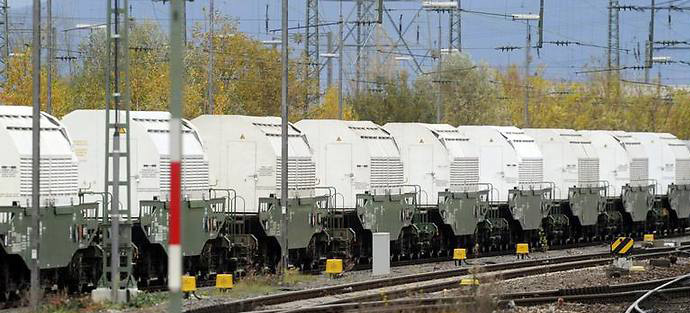Nuclear Transparency Watch sent a letter addressed to Mr Oettinger, the European Commissionner for Energy concerning illegal radioactive waste export from Hungary to Russia.
It is a first step in order to monitor nuclear activities and improve transparency in this sector !
We received an acknowledgement of receipt and two months later a reply from the European Commission.
However, this reply does not give us the answers we are entitled to wait for. That’s why we decided to send a new letter to the European Commission asking to be more precise and in order to clarify the issue.
| Action | Date | Condition |
| First complaint sent by letter to the European Commission | 26/11/2013 | Sent |
| Acknowledgement of receipt from the European Commission | 19/12/2013 | Received |
| Telephone reminder | 11/02/2014 | ok |
| Reply from the European Commission | 26/02/2014 | Received |
| New letter to have more precisions | 03/04/2014 | Sent |
| Waiting for a response. | 16/05/2014 | Still waiting |
Letter sent to Mr Oettinger : Radioactive waste export from Hungary to Russia
Brussels, 26 November 2013
Dear Mr. Oettinger,
Nuclear Transparency Watch has been informed that the Hungarian nuclear energy operator MVM is currently preparing the export of high-level nuclear waste from the INES 3 incident in 2003 in the Paks 2 unit to Mayak in Russia. We have been informed that the contracts for this export foresee transfer of ownership of this waste to Rosatom/ TVEL or another institution in Russia, and do not foresee any return of the waste for final disposal in Hungary or another EU country.
The 2011/70/EURATOM Directive of 19 July 2011 states the following:
Art. 4(1): Member States shall establish and maintain national policies on spent fuel and radioactive waste management.
Without prejudice to Article 2(3), each Member State shall have ultimate responsibility for management of the spent fuel and radioactive waste generated in it.
Art. 4(2): Where radioactive waste or spent fuel is shipped for processing or reprocessing to a Member State or a third country, the ultimate responsibility for the safe and responsible disposal of those materials, including any waste as a byproduct, shall remain with the Member State or third country from which the radioactive material was shipped.
Art. 4(4): Radioactive waste shall be disposed of in the Member State in which it was generated, unless at the time of shipment an agreement, taking into account the criteria established by the Commission in accordance with Article 16(2) of Directive 2006/117/Euratom, has entered into force between the Member State concerned and another Member State or a third country to use a disposal facility in one of them.
Nuclear Transparency Watch has been informed that the shipment of this high-level waste to Mayak will not be for the purpose of reprocessing with consecutive return of the reprocessing products and waste by-products to Hungary, but for a transfer of the waste, including transfer of ownership of the waste, to Rosatom / TVEL or another institution in Russia.
Nuclear Transparency Watch has been informed that even in case the new owner would decide to reprocess the waste, waste produced as by-product as well as retrieved products for which no further use can be found will remain in Russia and under ownership of the new owner, i.e. out of the ultimate responsibility of MVM.
Nuclear Transparency Watch is aware of the fact that neither Rosatom / TVEL nor any other Russian institution, nor Russia as state has a licensed and operating final disposal facility for high-level waste. The agreement(s) made between MVM and Rosatom / TVEL or another Russian institution therefore cannot provide any insurance concerning final disposal of this waste or products and by-products of reprocessing in case the new owner would use that option.
The operations of Rosatom / TVEL in Mayak include temporary storage of high-level wastes, but no operational final disposal that would fulfil EU quality standards. As far as we have been informed, the agreement between MVM and Rosatom / TVEL or another institution does not foresee repatriation of the waste to Hungary in case Rosatom / TVEL or any other institution in Russia fails to provide such a final disposal.
Nuclear Transparency Watch is furthermore aware of the dismal track record of Rosatom / TVEL’s Mayak operations and the historical and current exposure of the surrounding population to unacceptable levels of radioactivity and lack of sufficient care and compensation for the effects of historical exposures. Given that track record, Nuclear Transparency Watch has severe concerns about whether even temporary storage or processing and consecutive storage of the waste would fulfil EU standards.
Nuclear Transparency Watch is not convinced that MVM or Hungary will be able to execute its ultimate responsibility for care of this waste in case the new owners or Russia fail to fulfil EU quality standards, nor is Nuclear Transparency Watch convinced that MVM or even the Hungarian Armed Forces would be able to repatriate the waste in case EU quality levels would be flouted by the new owners or Russia.
With that, Nuclear Transparency Watch is convinced that MVM and Hungary under this plan are giving up their ultimate responsibility for this waste.
Nuclear Transparency Watch hereby asks the European Commission the following:
1. Is the European Commission informed as prescribed in art. 4.4 of the Directive of this planned export of high level radioactive waste?
2. Given the above, what is the opinion of the European Commission concerning the legality of this export?
3. Given the fact that this export means a de facto transfer of ultimate responsibility of high-level radioactive waste from an EU Member State to a third state, which steps will the European Commission take to prevent this waste export?
With regards,
Mrs. Michele Rivasi, Chair
Nuclear Transparency Watch (NTW)
